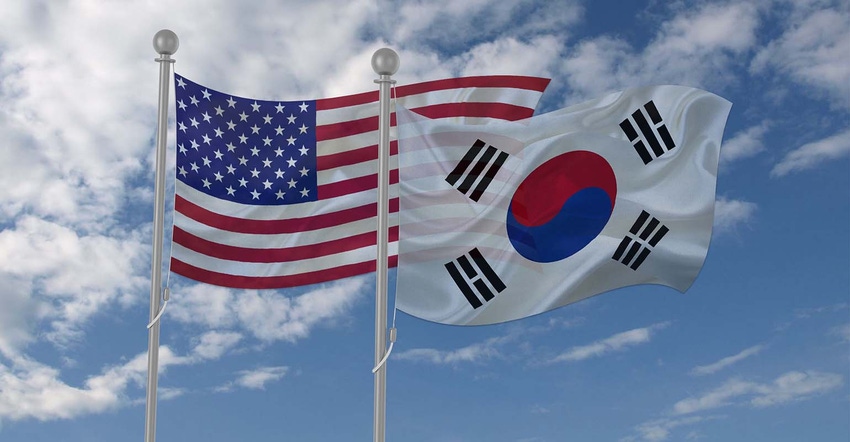
That the U.S. negotiated a new free trade agreement with South Korea without affecting agriculture amounts to “the dog that did not bark,” University of California-Davis agricultural economist Daniel Sumner says.
Agriculture was ubiquitously absent from the deal announced March 28 by U.S. Trade Representative Robert Lighthizer and Korean Minister for Trade Hyun Chong Kim, which addressed issues related to automobiles, pharmaceuticals, currency and textiles.
That means the benefits to ag from the original 2012 agreement remain intact, notes Sumner, director of the university’s Agricultural Issues Center.
“For agriculture, in a sense, the only thing we had was a downside because we weren’t going to get much better out of the Koreans,” he says. “The good thing was we didn’t allow them to close the market any further.”
Sumner equates agriculture’s lack of a role in the new Korea talks to the Sherlock Holmes short story, “The Adventure of Silver Blaze,” by Arthur Conan Doyle. In the story, Holmes solves the mystery of a race horse’s disappearance by noticing a dog near the stables didn’t bark when the horse was taken.
With agriculture spared the prospect of new tariffs or other trade barriers in South Korea, it’s one less thing for growers to worry about in the world of trade, Sumner reasons.
“The fact that we didn’t have any kind of big disruption in the Korean free trade agreement in the deal they just cut is very good news,” he says.
The 2012 agreement immediately removed tariffs on two-thirds of U.S. farm and food exports to South Korea, the USDA explains. Already, the United States’ average exports to South Korea increased from $5.4 billion in the three-year period before the deal’s implementation, in 2009-2011, to $6.37 billion in the three years following, from 2014-2016, according to the agency.
Do No Harm
One commodity that’s benefitted from the deal is California citrus, which accounted for one-fifth of the roughly $900 million in agricultural goods from the Golden State that went to South Korea in 2016, notes Joel Nelsen, president of California Citrus Mutual. The 2,500-member organization had urged U.S. negotiators “to do no harm,” Nelsen says.
“When the president started making noises (about South Korean trade), we all started to get nervous,” he says of ag groups. “We had a good deal and we didn’t want to see any unintended consequences.
“The USDA had indicated to all of us that they were working to keep the horticulture section off the table,” Nelsen says. “The U.S. Trade Representative had made a commitment to do that as well, and they did it.”
South Korea agreed last year to consider amending the trade agreement after President Donald Trump threatened to withdraw from the deal, which the U.S. blamed for increasing its trade deficit. The amended pact comes as the farm sector has been thrust into uncertainty with China threatening to slap tariffs as high as 25 percent on some U.S. agricultural goods in retaliation for the Trump administration’s decision to impose duties on imported steel and aluminum.
USDA Secretary Sonny Perdue issued a statement applauding the new pact, noting that South Korea now ranks as the U.S.’ sixth highest-value market for agricultural goods.
“U.S. agricultural exports to the country have increased 95 percent over the past decade and we look forward to continued growth,” Perdue says.
Farm Groups Applaud Deal
Farm groups also cheer the revised deal, including the U.S. Meat Export Federation. President and chief executive officer Don Halstrom said in a statement that the pact “helps ensure that we will continue to be able to serve the growing South Korean market and a crucially important customer base.”
The U.S. is the largest supplier of beef to South Korea and trails only the European Union as the second-largest pork supplier, according to USMEF. U.S. red meat exports to Korea set a record last year at $1.7 billion, up 19 percent year-over-year and up 69 percent from 2012, according to the organization.
Under the 2012 pact, most U.S. pork products now enter Korea duty-free, and the duty on U.S. beef has been reduced from 40 percent to 21.3 percent and will continue to decline each year until it is eliminated by 2026, USMEF says.
“It is especially important that these tariff rate reductions are maintained because the other major pork and beef suppliers to Korea also have free trade agreements with similar market access terms,” Halstrom says.
About the Author(s)
You May Also Like






